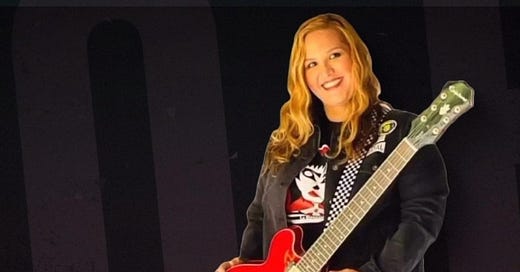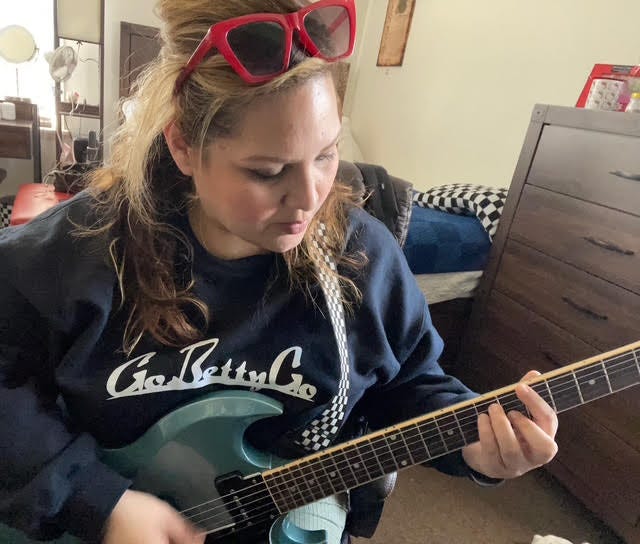For 25 years, Los Angeles punk-pop coven Go Betty Go charted a remarkable course through rock and roll’s perilous jungles. The all-female quartet’s safari was hyper-dynamic, at times Sisyphean; the band completely exploded, extricated itself from smoldering, toxic wreckage, climbed tortuously back to life only to once again be plunged into a vortex of a catastrophic adversity so dire it seemed impervious to any known, or unknown, remedy.
Conceived by malcontent teen siblings Aixa and Nicolette Vilar, guitar swashbuckler Betty Cisneros and bassist Michelle Rangel, the four quickly found their way—and band name, a spontaneous mid-rehearsal incantation. From inception, GBG’s key attribute was (a: its authenticity, a quality which lends their music a distinctive, arresting and instantly recognizable sound and (b: Betty’s rampaging, idiosyncratic guitar. Her style was ideal, never obtrusive or overplayed and blazing with combustible appeal. Betty’s ax didn’t just walk and talk—it informed.
GBG’s luminous, banging, bilingual set drew capacity crowds and vouchsafed a swift and steady ascent, with stacks of positive press, lucrative song placements, successive slots on coast-to-coast Warped Tours but, days ahead of a national tour with MxPx, Nicolette up and quit. Split. Left it all behind.
wtf?
Inexorably, a just-for-the-hell-of-it gig reunited them into a formal resurrection. They resumed roadlife, their fiery, punk rock testimony more persuasive and ferocious than ever.
Nah.
Comes now Betty’s stage 4 cancer diagnosis. Nightmare. Terror. Sufferation.
“She went to the ER, feeling unwell. We all knew something wasn’t right, but none of us imagined how serious it was,” Aixa said. “Two days later, April 18, 2022, she received the devastating news—rectal cancer. What followed was a whirlwind of tests, treatments, and more heartbreaking discoveries, as additional diagnoses involving her liver and ovaries soon followed.”
“None of us had ever faced something like this before. Stage 4 cancer—the words alone were terrifying. In those early days, we clung to optimism, believing that maybe six months of treatment would get her back to her old self. Looking back, we realize how little we understood . . . but one thing was clear—Betty was not fighting this alone. No matter how long the road, we were in it with her, every step of the way.”
The challenge was immediately met with multiple fundraising efforts, benefit performances (with boss rocker Adam Bones filling in) and doing everything in their spiritual and physical power to fight for the guitarist’s wellbeing and recovery.
“Betty has endured grueling surgeries and relentless challenges,” Aixa said. “Last April, she spent nearly a month in the hospital, battling severe complications that, thankfully, she overcame with the same resilience that defines her. The simplest daily tasks became difficult, let alone playing guitar.”
“On top of everything else, the chemo has taken a toll on her hands, severely numbing her fingers. It’s something she’s had to adapt to, not knowing if the sharpness and numbness will ever fully go away. But in true Betty fashion, she refuses to let it stop her. Instead of giving up, she has re-taught herself how to play, pushing through it all with unwavering determination.”
Last summer, not at all unmiraculously, Betty returned to the studio and recorded six tracks for GBG’s Black and Blue EP. Her distinctive, deliciously unconventional guitar style reached a dizzying height of dynamism that supercharges the disk; it’s captivating, fiery, free-wheeling and, above all else, completely liberated from the diseases’ infernal attempts to hobble her.
Conceived and executed under harrowingly difficult circumstances, Black and Blue represents Betty’s inexhaustible dedication and tenacity, qualities that carry an electrifying appeal. And now, finally, she’s returning to live performances, with a last week’s Las Vegas show and tonight’s sold-out Echo appearance—three years to the day of her diagnosis—followed by a nine-date West Coast run with the Dollyrots.
“It’s surreal,” Betty said. “Honestly, I can’t believe the day is finally here. I’m nervous, I’m excited, I never imagined it would take three years, but here we are. It was very difficult, mentally and physically challenging. 2024 was a very painful year for me, with the surgeries, complications and recovery, but we made it. I may not be 100%, but I’ll do my best to give you 100%.”
“Physically, I’m as good as I can be. I’ve learned to live with the nerve damage caused by chemo. My hands and feet continue to be numb, as well as my left leg above the knee. And in my torso, where the ileostomy previously was located. The sensation to these areas is not great to the touch, but at this point, I’ve grown to deal with it as best as I can.”
“I am not in the clear yet. My doctors haven’t said I’m cancer free,” she said. “My scans are still lighting up and currently, that’s what their focus is on. I have another scan coming up which will hopefully determine if what they saw in the previous scan is or isn’t cancer and we’ll go from there.”
This thousand-day pall of grave menace, indeterminable risk, and immeasurable threat beggars’ comprehension, and Betty’s response has been nothing short of astonishing.
The crush of stress and anxiety, not to mention the horrorshow financial burdens, are truly beyond understanding. Go Betty Go has always operated as a closer-than-family, near lifelong creative order and these few years grim experience has fused the quartet into an entirely singular psychic entity. In performance, it’s bound to generate a spectacular new musical/emotional reality.
“Betty’s miraculous recovery and her return to the stage is a monumental achievement—not just for her, but for all of us. It’s a testament to her strength as a survivor,” Nicolette said. “We’ve poured a lot of work into creating new songs, and we’re thrilled to finally perform them together as the original lineup—this will be particularly meaningful.”
“We’re so lucky to get to do this again,“ Michelle said. “There’s nothing like the four of us together.”




